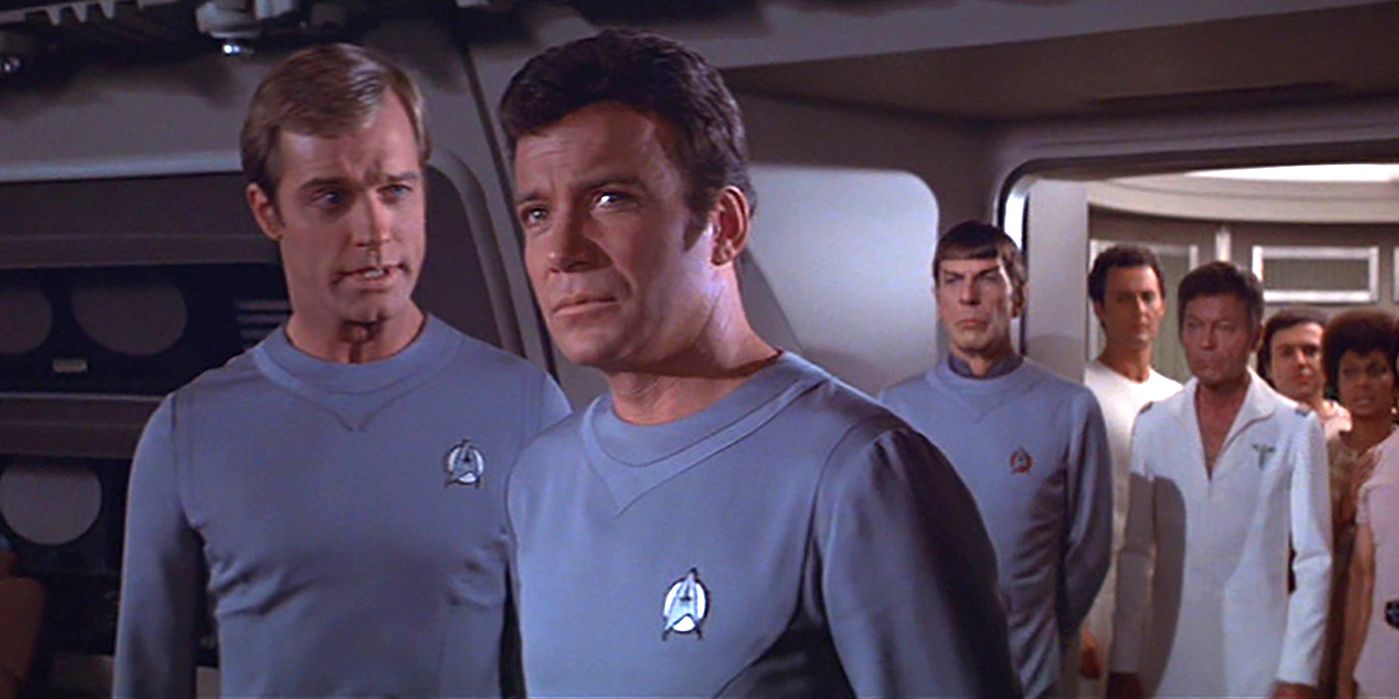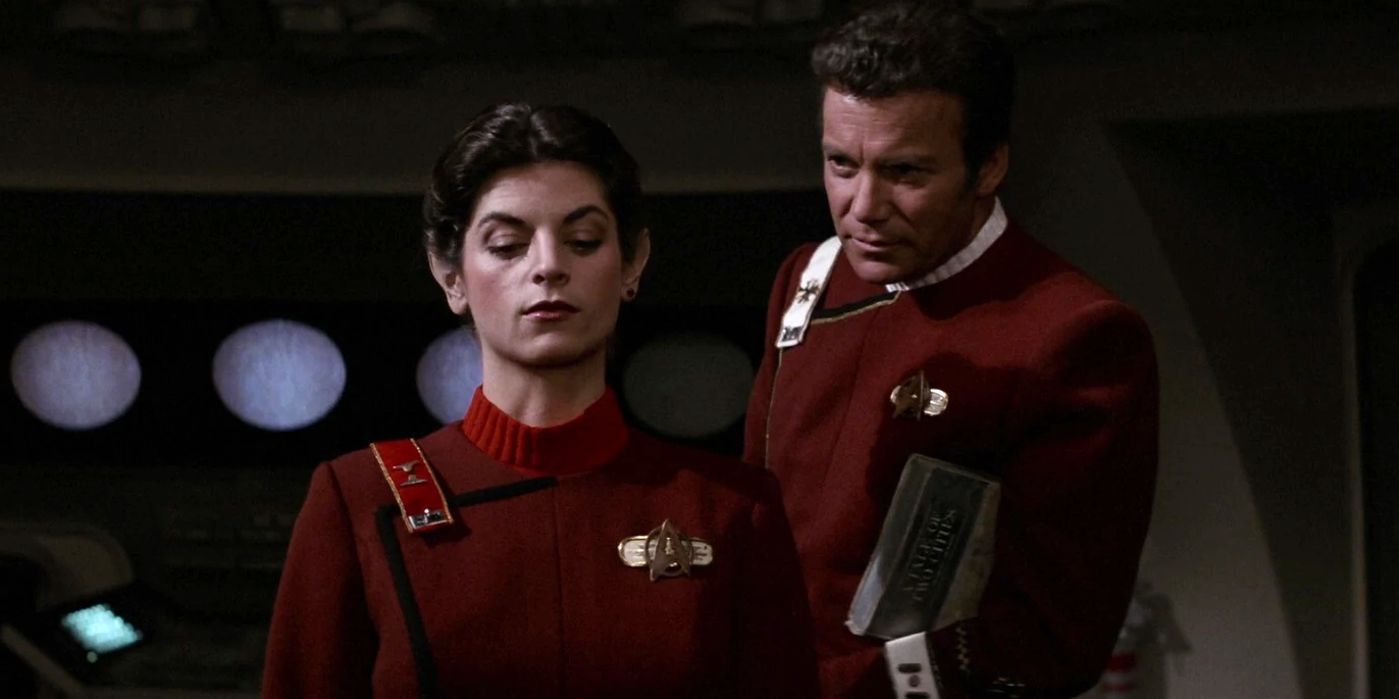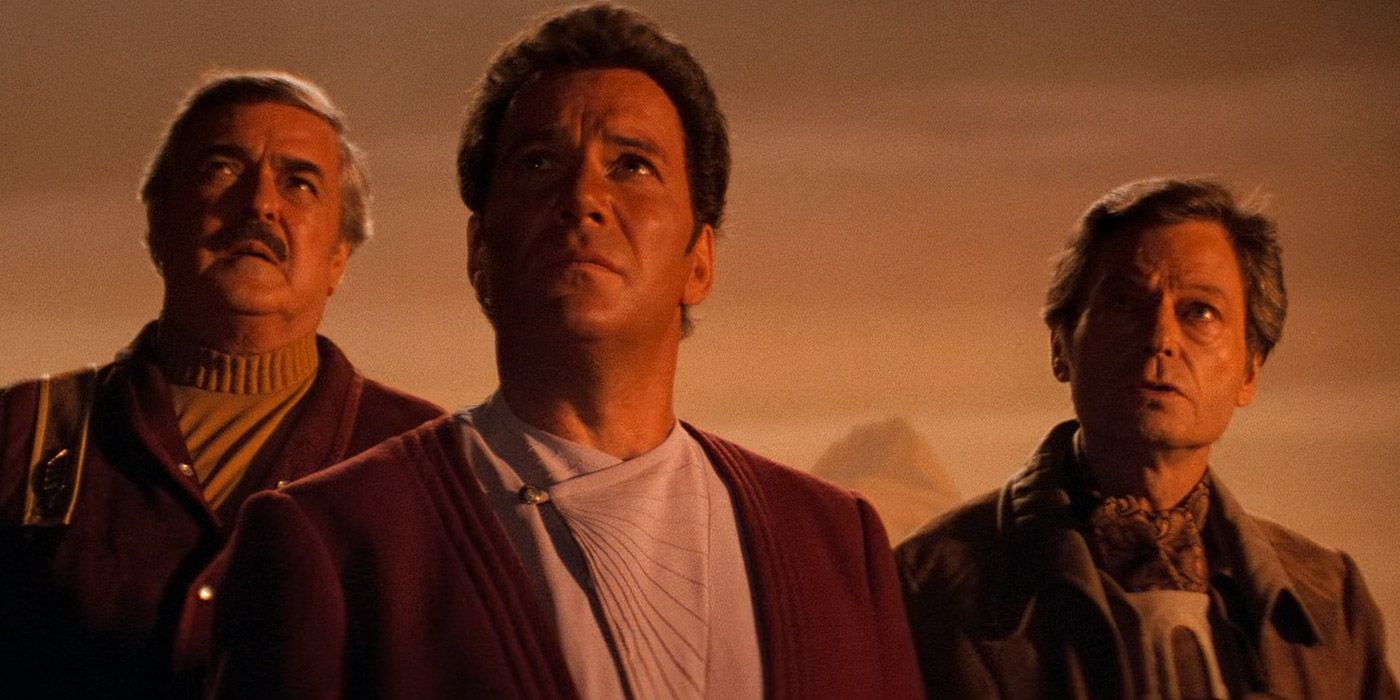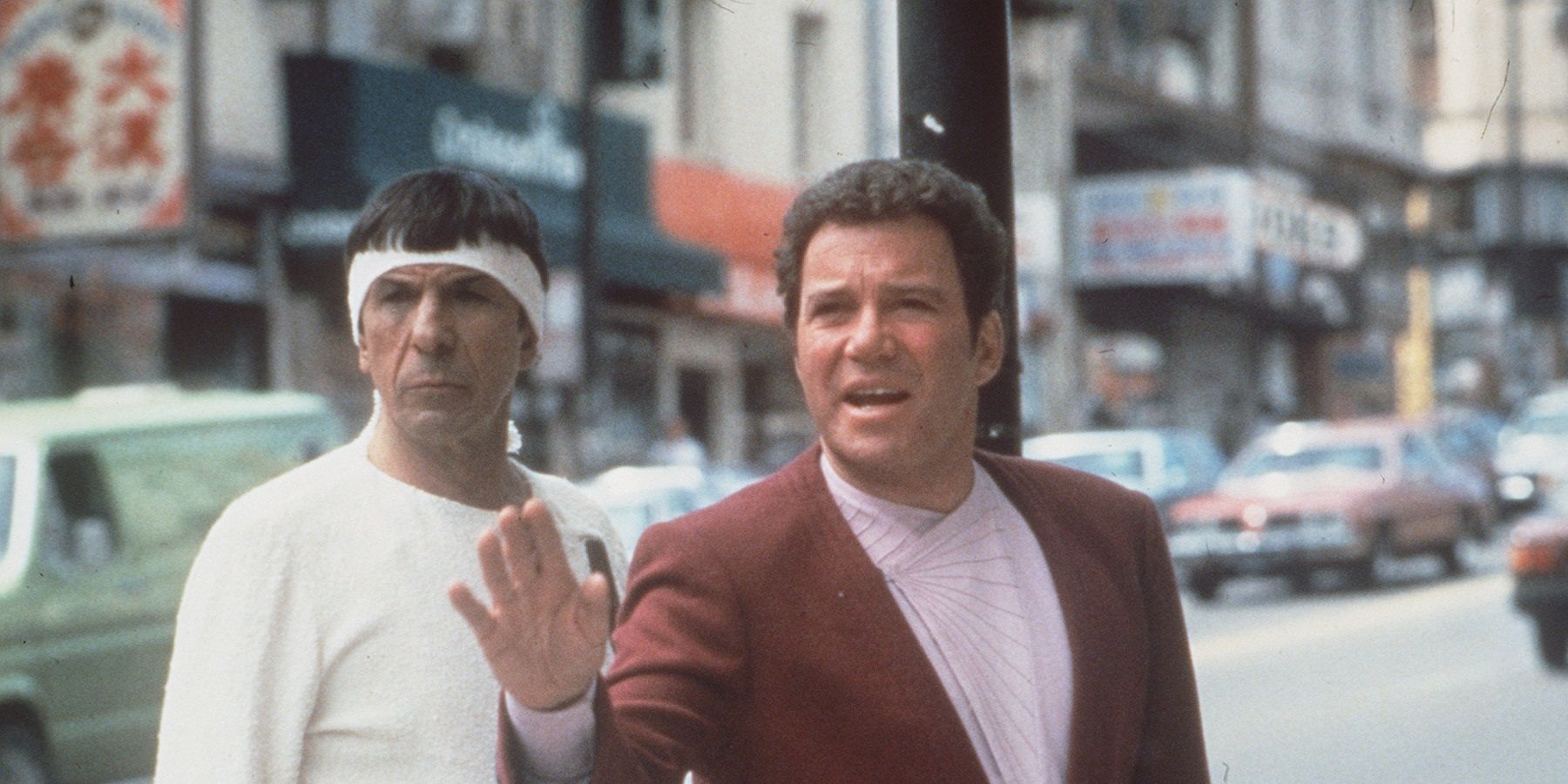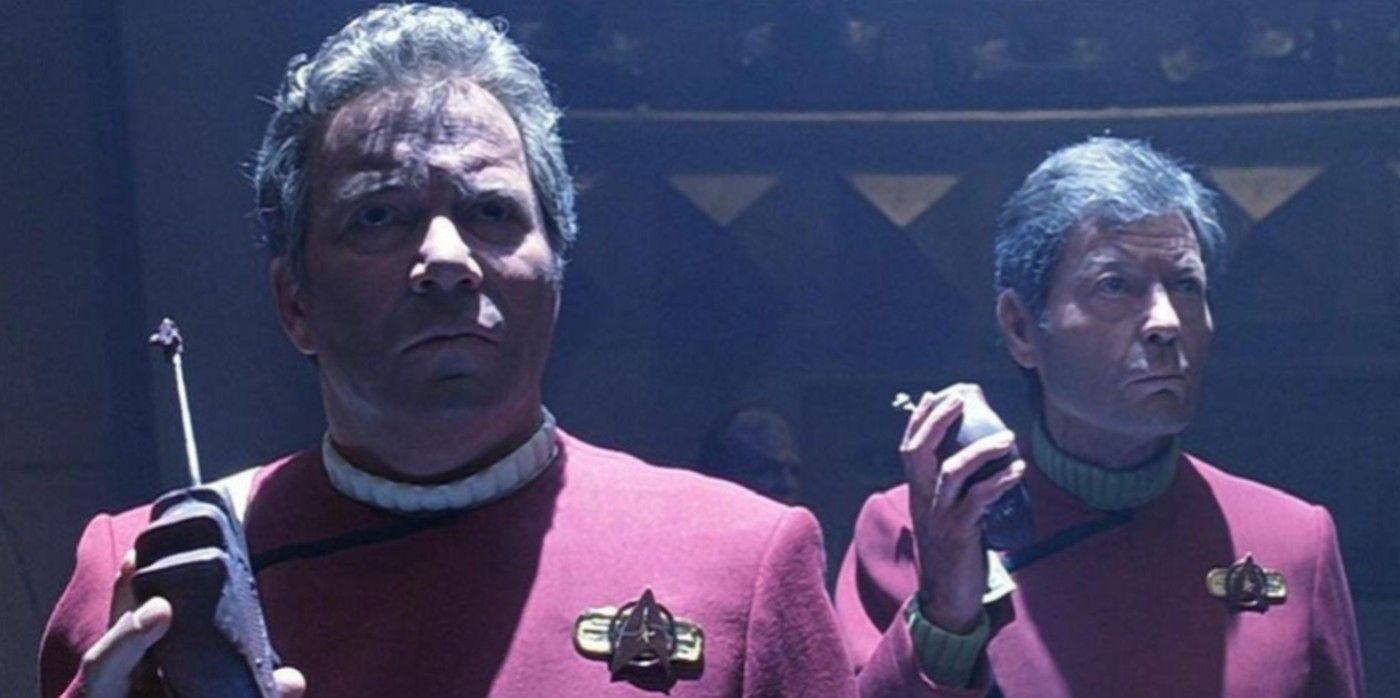Every Crime Admiral Kirk Committed In The Star Trek TOS Movies
Admiral James T. Kirk (William Shatner) has never been a boy scout, but he committed several crimes in the Star Trek movies that ultimately resulted in a demotion back to Captain. As Captain of the USS Enterprise, Kirk has always been about taking risks, and he once delivered a famous monologue that “risk is our business” in Star Trek: The Original Series. In the Star Trek movies, however, Kirk risked his own career to do what he felt was right, especially after the death of Spock (Leonard Nimoy) in Star Trek II: The Wrath of Khan.
Kirk became an Admiral and Chief of Starfleet Operations in the years after his historic five-year mission in TOS and the start of Star Trek: The Motion Picture. But sitting at a desk when he was still in his prime years disagreed with Kirk. In the first two Star Trek movies, Jim took advantage of every opportunity to get back on the bridge of the USS Enterprise, but his actions were more of an abuse of his rank than outright crimes. It wasn’t until Star Trek III: The Search for Spock that Admiral Kirk began flagrantly breaking Starfleet regulations, and he faced court-martial for his offenses in Star Trek VI: The Voyage Home. These are the crimes of Admiral James T. Kirk in the original six Star Trek movies.
5 Kirk Took The Enterprise From Decker In Star Trek: The Motion Picture
Admiral Kirk opened Star Trek: The Motion Picture by taking the Captaincy of the Enterprise away from Willard Decker (Stephen Collins), who Kirk recommended as his replacement. Kirk used the imminent threat V’Ger posed to Earth as an excuse to assume command of the Enterprise and intercept the massive living machine. While not technically a crime, what Kirk did to Decker by taking his command away and demoting him to First Officer and Science Officer – until Spock arrived to assume the latter duty – was an abuse of his authority and certainly dishonorable.
Admiral Kirk was initially a liability, and Decker was intimately familiar with the operations and capabilities of the refitted Enterprise in ways Kirk was not. In fact, it was Decker’s quick thinking to fire a photon torpedo instead of Kirk’s ordering phasers that saved the Enterprise from destruction when it was caught in a wormhole. While Kirk ultimately led the Enterprise to save the Earth, and Decker ended up joining himself with V’Ger and a construct of Lt. Ilia (Persis Khambatta) at the end of Star Trek: The Motion Picture, the way Kirk shoehorned himself into commanding the Enterprise was a dirty move.
4 Kirk’s Kobayashi Maru Cheating In Star Trek II: The Wrath Of Khan
Admiral Kirk was at his best as a starship commander in the latter half of Star Trek II: The Wrath of Khan, although he was rusty in the Captain’s chair at first, which allowed Khan Noonien Singh (Ricardo Montalbán) to get the drop on the Enterprise and disable it. However, Kirk, with help from Dr. Leonard McCoy (DeForest Kelley), admitted to a crime when he was a Starfleet Cadet. Kirk confirmed to Lt. Saavik (Kirstie Alley) that he cheated in the Kobayashi Maru test, and he’s proud of it.
After failing the test previously, Kirk reprogrammed the Kobayashi Maru so that it was possible for him to win. Instead of disciplinary action, as the Kelvin timeline version of James T. Kirk (Chris Pine), faced in J.J. Abrams’ Star Trek 2009, Jim was awarded a commendation for original thinking. This likely fueled Kirk’s belief that he could flaunt rules as he saw fit. And, after all, Kirk didn’t believe in the no-win scenario, and he didn’t like to lose, not even a test of character.
3 Kirk’s Multiple Crimes In Star Trek III: The Search For Spock
In Star Trek III: The Search for Spock, Admiral Kirk committed actual, prosecutable crimes against Starfleet. When Spock’s father, Ambassador Sarek (Mark Lenard), charged Kirk with retrieving Spock’s katra (his Vulcan soul) from the Genesis planet, the Admiral willingly broke his vows to Starfleet. Dr. McCoy, Scotty (James Doohan), Uhura (Nichelle Nichols), Sulu (George Takei), and Chekov (Walter Koening), all joined Kirk in mutiny and insurrection for the sake of Spock.
With Kirk leading the charge, his crew/co-conspirators stole the USS Enterprise, which was scheduled to be decommissioned. Scotty, who was assigned to the USS Excelsior, sabotaged its revolutionary transwarp drive so that “The Great Experiment” couldn’t pursue the escaping Enterprise. Kirk’s crew also held Starfleet Officers prisoner en route to their theft of the Enterprise. Finally, Kirk ordered the Enterprise’s auto-destruct to blow up the ship rather than letting it fall into Klingon hands. While not crimes against Starfleet, Kirk killed the Klingon Captain Kruge (Christopher Lloyd) and hijacked his Bird-of-Prey to escape the doomed planet created by the Genesis Device with the resurrected Spock.
2 Kirk Disobeyed Orders To Time Travel In Star Trek IV: The Voyage Home
At the start of Star Trek IV: The Voyage Home, Admiral Kirk and the Enterprise crew were prepared to return to Earth and face the music for their crimes in The Seach For Spock. But when a mysterious whale probe threatened to destroy Earth, Kirk once again ignored orders and opted to time travel to the 20th century to find and bring back two humpback whales, which the Enterprise crew hoped would stop the probe. Kirk’s admittedly “crazy” gambit succeeded, and the Enterprise crew saved the Earth once again. Although, technically, Kirk did steal a couple of whales that didn’t belong to him.
Finally facing their court-martial, the Enterprise crew found all charges dropped by the United Federation of Planets’ Council because they saved the world. Ultimately, Admiral Kirk and his crew were brought up on nine charges, six of which were read aloud, including “Conspiracy; Assault on Federation officers; Theft of Federation property, namely the Starship Enterprise; Sabotage of the USS Excelsior; Willful destruction of Federation property, specifically the aforementioned USS Enterprise, and disobeying the direct orders of a Starfleet commander.”
Kirk was the only one held accountable for the lone final charge, disobeying the direct orders of a Starfleet commander. His punishment was a demotion to Captain, which is ultimately what Kirk desired all along. Truthfully, ever since he accepted a promotion to Admiral. Finally, Kirk was given a starship to command, the USS Enterprise-A. After a roller coaster of crimes and misdemeanors across four Star Trek movies, Kirk had come “home” to be the Captain of the Enterprise once more.
1 Kirk Convicted Of Assassinating Chancellor Gorkon In Star Trek VI: The Undiscovered Country
Remarkably, Captain Kirk committed no crimes against Starfleet in the William Shatner-directed Star Trek V: The Final Frontier. But Kirk was falsely accused and convicted of a truly heinous crime in Star Trek VI: The Undiscovered Country: the assassination of Klingon Chancellor Gorkon (David Warner). The Klingons arrested, tried, and sentenced Kirk and Bones to life imprisonment on the ice world of Rura Penthe.
However, Kirk and McCoy were in no way guilty; they were framed and Gorkon was assassinated by a conspiracy between Starfleet and the Klingons to prevent peace between the two galactic powers. With the help of Spock and the Enterprise, Kirk and McCoy escaped, exposed the conspiracy, and the Enterprise heroes ended the Star Trek: The Original Series movies by saving civilization as they know it. And, as McCoy knowingly joked in the final moments of the film, “the good news is they’re not gonna prosecute.”




